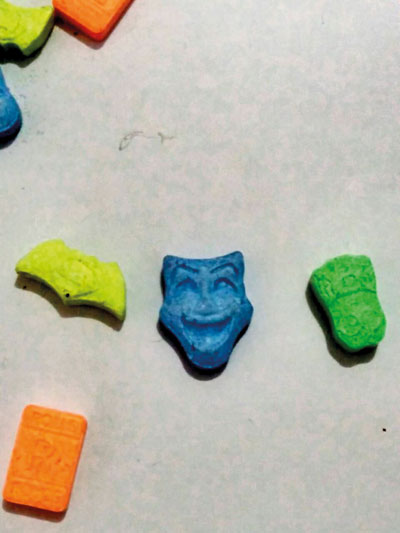News
Growing trend of affluent youth taking to high-end drugs, warn officials
The increasing use of synthetic drugs and abuse of prescription medicines among young people is a worrying trend and needs more attention, authorities point out.

Ecstasy tablets seized in a raid in Nugegoda
Synthetic drugs such as ‘Ecstasy,’ ‘Crystal Meth,’ ‘Ice,’ ‘Ketamine’ and ‘LSD’ are now available in Sri Lanka and are becoming increasingly popular among young people, especially those from affluent backgrounds, according to officials.
“Nearly all users of these drugs are below 30 years of age,” Excise Department’s Special Operations Unit head G.N. Hemantha said.
He said the usage is highest among young people in Colombo, the southern coastal belt, Negombo and surrounding areas, and in Potuvil in the east.
Many of these areas are popular tourist destinations and there is suspicion that locals have been exposed to the use of these drugs through them. In addition some Sri Lankans who go abroad also experiment with these drugs overseas and bring them to Sri Lanka.
The availability of synthetic drugs has reached nowhere near the same level as ganja or heroin, mainly due to those being a lot more expensive, but the addictive nature of these drugs, and the fact that their main target is young people, is a cause for serious concern, Mr. Hemantha noted.
He said there were increasing reports of young people using these drugs at nightclubs and parties. In May this year, the Excise Department made the largest seizure of “Ecstasy” in the country when it recovered 1672 tablets during a raid in Nugegoda. The young software engineer who was arrested in possession of the drug had purchased them from an online black market site on the so-called “Dark Web.”
Sri Lanka Customs has also detected attempts to smuggle the drug into Sri Lanka, Customs spokesman Sunil Jayarathna said. In August, last year, officials detected 1000 tablets of ecstasy in an Air Mail parcel at the Colombo Parcel Post. A Sri Lankan national, who had purchased the drugs and had them posted here was arrested.
“Ecstasy,” medically known as Methylenedioxy-methamphetamine (MDMA) is widely referred to as a “party drug” as is a popular drug among party-goers and at nightclubs. According to the US Drug Enforcement Agency (DEA) this synthetic drug causes changes in perception, including euphoria and increased sensitivity to touch, energy, sensual and sexual arousal, need to be touched, and need for stimulation. Harmful side effects include confusion, anxiety, depression, paranoia, sleep problems, and drug craving.
Also in May, last year, the Excise Department seized 200 grams of methamphetamines or “Crystal Meth” from the Elakanda area in Wattala, in the first such detection of its kind in the country. Two women were arrested along with the drugs.
Mr. Hemantha said the women were trading in jewellery and clothes. The suspects would take jewellery to be sold in India and return with clothes to sell in Sri Lanka. The women however, were also engaged in the trafficking of methamphetamines. “They were purchasing the drugs from a dealer in India and smuggling them in when they returned to Sri Lanka,” he said.
Methamphetamine, known as “Crystal Meth” or “Ice” is a highly addictive illegal drug classified in the same class as cocaine and other powerful stimulants. It is mostly used as a recreational or “club drug” and provides a long-lasting euphoric effect. According to medical experts, long term side effects of the drug can include loss of appetite, psychosis including paranoia and hallucinations, aggressive or violent behaviour, breathing problems, significant weight loss and depression.
“The danger is that many young people are under the misconception that these drugs are not as additive as hard drugs and are relatively harmless,” Mr Hemantha said. “But, they need to realize that some of these are just as addictive and can cause terrible long term damage to their health.”
Action is also being taken regarding the abuse of certain pain medications which are thought to be used as opioid substitutes by drug addicts. One particular painkiller that authorities are cracking down on is Tramadol. Most recently, Customs officials at the Bandaranaike International Airport (BIA) arrested a Sri Lankan at the Arrival Lounge with 584 cards of Tramadol hidden in his luggage. It was suspected that he was trying to sell them to local buyers.

